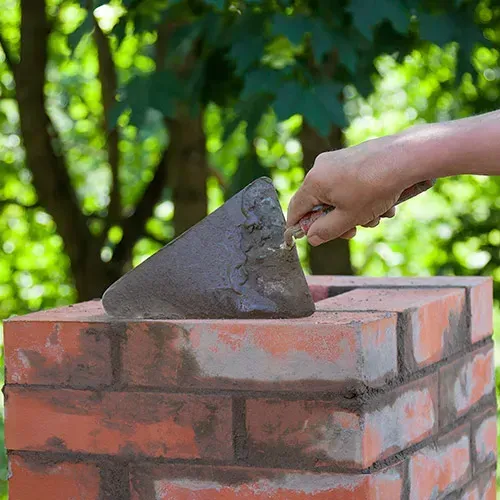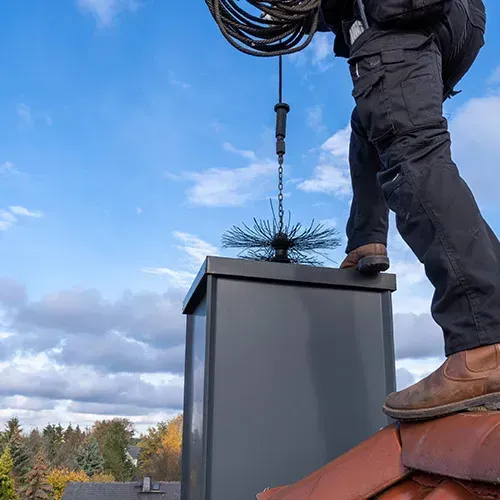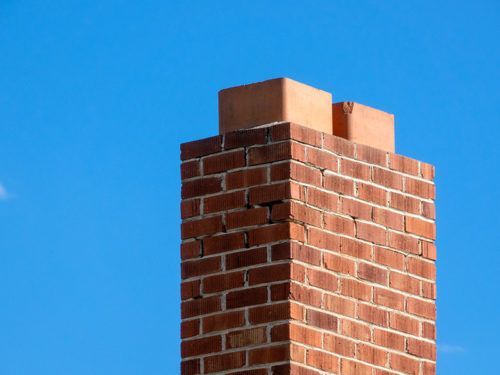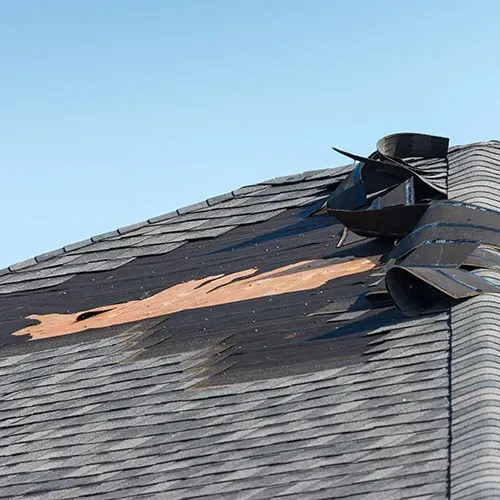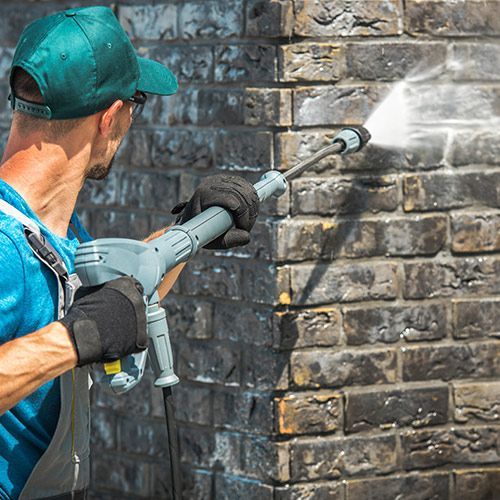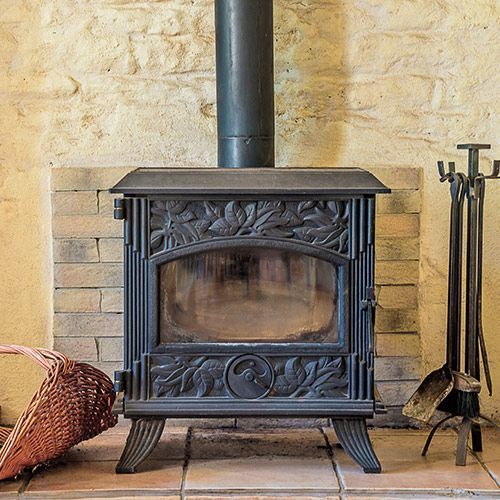Q&A
Find Out More
Frequently Asked Questions
We know that our clients may have many questions about chimneys, chimney cleaning, and our services. We’re ready to answer the most common. Consider giving us a call today for more information.
How often should I have my chimney swept?
This a tougher question than it sounds. The simple answer is: The National Fire Protection Association Standard 211 says, “Chimneys, fireplaces, and vents shall be inspected at least once a year for soundness, freedom from deposits, and correct clearances. Cleaning, maintenance, and repairs shall be done if necessary.” This is the national safety standard and is the correct way to approach the problem. It takes into account the fact that even if you don’t use your chimney much, animals may build nests in the flue or there may be other types of deterioration that could make the chimney unsafe to use.
The Chimney Safety Institute of America recommends that open masonry fireplaces should be swept at 1/8″ of sooty buildup, and sooner if there is any glaze present in the system. This is considered to be enough fuel buildup to cause a chimney fire capable of damaging the chimney or spreading to the home. Factory-built fireplaces should be swept when any appreciable buildup occurs. The logic is that the deposit is quite acidic and can shorten the life of the fireplace.
My fireplace stinks, especially in the summer. What can I do?
The smell is due to creosote deposits in the chimney, a natural byproduct of woodburning. The odor is usually worse in the summer when the humidity is high and the air conditioner is turned on. A good sweeping will help but usually won’t solve the problem completely. There are commercial chimney deodorants that work pretty well, and many people have good results with baking soda or even kitty litter set in the fireplace. The real problem is the air being drawn down the chimney, a symptom of overall pressure problems in the house. Some make-up air should be introduced somewhere else in the house. A tight sealing, top mounted damper will also reduce this air flow coming down the chimney.
When I build a fire in my upstairs fireplace, I get smoke from the basement fireplace.
This has become quite a common problem in modern air tight houses where weather-proofing has sealed up the usual air infiltration routes. The fireplace in use exhausts household air until a negative pressure situation exists. If the house is fairly tight, the simplest route for makeup air to enter the structure is often the unused fireplace chimney. As air is drawn down this unused flue, it picks up smoke that is exiting nearby from the fireplace in use and delivers the smoke to the living area. The best solution is to provide makeup air to the house so the negative pressure problem no longer exists, thus eliminating not only the smoke problem, but also the potential for carbon monoxide to be drawn back down the furnace chimney. A secondary solution is to install a top mount damper on the fireplace that is used the least.
I heat with gas. Should this chimney be checked too?
Without a doubt! Although gas is generally a clean burning fuel, the chimney can become non-functional from bird nests or other debris blocking the flue. Modern furnaces can also cause many problems with the average flues intended to vent the older generation of furnaces. We suggest you check the areas on gas and carbon monoxide for more information.
How do I know if he really cleaned my chimney?
“In the past, sweeps we’ve hired have always gone on the roof, checked the flashing, the mortar and all the workings of the chimney and then cleaned the chimney from the top of the house. Today, this sweep came in, looked into my fireplace from the bottom and said we don’t need it cleaned because he can still see the bricks. I asked to have it cleaned anyway. He then grabbed a wire brush and simply rubbed away any buildup from the main opening to the fireplace without even going up into the chimney to clean anything. Am I way off base, or did the sweep charge me without cleaning my chimney?”
Your past experiences with chimney sweeps sound as though the sweep did the job he was hired to do. However, your most recent experience sounds a bit odd. If the sweep agreed to do a complete sweeping and only cleaned the brick in the fireplace firebox, you did not get the service that you paid for. A complete chimney sweeping includes the chimney flue and smoke chamber.
In the future you could ask for a Level 1 chimney inspection and a chimney sweeping. If the sweep doesn’t know what a Level 1 inspection is, find one that does. A Level 1 inspection is detailed in the National Fire Protection Association 211: Standard on Chimneys, Fireplaces, Vents and Solid Fuel-Burning Appliances.
What stainless steel liners require insulation?
Liners for gas and oil-fired appliances do not require insulation to meet the manufacturers’ installation and warranty requirements. Because of the lower flue gas temperatures and lesser heat transfer they are less likely to catch surrounding combustible material on fire. Those that are used with solid fuel-burning appliances do, however. If combustible materials are in contact with the chimney there are provisions that allow the liner to be installed in what is defined as a zero/zero install. That means there may be zero clearance to the interior of the chimney and zero clearance to the exterior of the chimney . The insulation may be of the blanket type or an expanded mica or masonry insulation. There are some manufacturers that will list a liner for use without insulation if it conforms to the NFPA 211 construction requirements. The problem is that it is almost impossible to determine that without destroying the chimney. It makes much more sense to insulate every liner serving a wood burning appliance. Even gas and oil-fired appliances that are vented into an exterior chimney will benefit from insulating the liner.
Do I Need to Have My Chimney Serviced?
The U.S. Consumer Product Safety Commission reports that in one year, 5,500 fires were attributed to chimneys. As a result of these fires, 130 people died, 230 people were injured, and total property loss was set at more than $184.4 million. In addition, there were a minimum of 119 deaths from carbon monoxide and at least 4,700 injuries were reported for the same time frame, though most estimates range much higher.
The root cause of most of these losses is that most U.S. homeowners are unaware that chimneys are an integral part of a home-heating system, and they require regular evaluation and maintenance. Most homeowners in this area have little working knowledge of chimney and venting systems. The fact that faults, damage, and problems are rarely visible to the casual observer complicates the situation. The threat of chimney fires and unsafe indoor air quality can be greatly reduced, perhaps even eliminated, if homeowners only understood that chimneys require regular maintenance.
How Often Should My Chimney Be Cleaned?
We recommend that you have your chimney cleaned every year. If you notice an odor or if your fireplace is not drafting properly, call us to inspect it before continuing to use it.
What Causes Creosote or “Soot”?
Creosote or “soot” is caused by simply burning materials, such as wood, in your fireplace. There is no way to prevent the build up of creosote. Now you are probably asking, “What is creosote?” It is basically unburned fuel that gathers in the form of black powder, flakes, or a baked-on glaze, depending on the degree of buildup. This is one of the main causes of chimney fires. When there is an excess buildup of creosote in the chimney and temperatures rise, the soot is ignited and an actual fire is started inside your chimney, showering your roof with sparks.
Ask Us Your Question
Why Pick Evergreen Chimney & Home Improvement?
From Chimney Cleaning to Roof Repair, We’ve Got You Covered
Chimney Repairs
Our family business has over a quarter century experience in chimney and home improvement services. Learn more about who we are & how we do business.
Chimney Services
We offer a complete list of chimney services, including sweeping & cleaning, repairs, replacements, construction, maintenance and safety inspections.
Masonry Services
Evergreen does big "around the house" jobs, so our customers don't have to. Our specialties include masonry, roofing, and pressure washing.
Areas We Serve
You deserve to work with a professional that will provide you with outstanding service. Consider giving us a call at (570) 257-4635 to learn more.
- Archbald, PA Archbald, PA 18403, United States of America
- Bushkill, PA Bushkill, PA 18324, United States of America
- East Stroudsburg, PA East Stroudsburg, PA 18301, United States of America
- Greentown, PA Greentown, PA 18426, United States of America
- Hawley, PA Hawley, PA 18428, United States of America
- Honesdale, PA Honesdale, PA 18431, United States of America
- Milford, PA Milford, PA 18337, United States of America
- Pittston, PA Pittston, PA 18640, United States of America
- Pocono Lake, PA Pocono Lake, PA 18347, United States of America
- Scranton, PA Scranton, PA 18510, United States of America
- Stroudsburg, PA Stroudsburg, PA 18360, United States of America
- Wilkes Barre, PA Wilkes-Barre, PA 18702, United States of America
Schedule Chimney Service
Find out more about what we do by calling (570) 257-4635.

